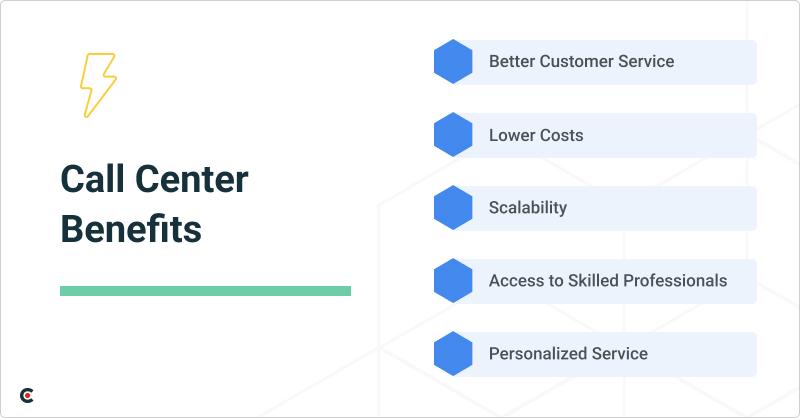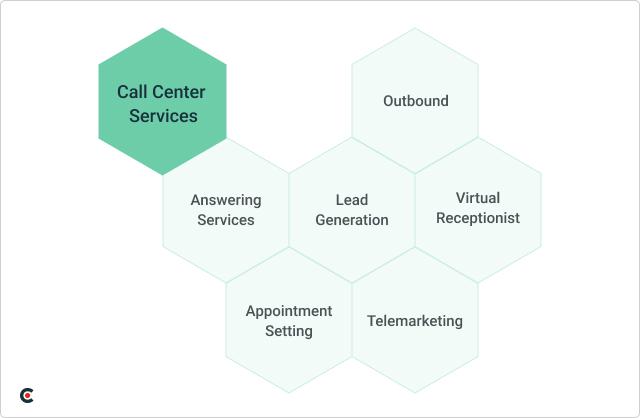Updated February 11, 2026
Customer care and support are integral to business success, and call centers are critical to having efficient and effective communication lines with customers. Over the last few decades, call center services have seen unprecedented growth in demand as businesses aim to provide the best experience for their target market. In this detailed hiring guide, we’ll explore what call center services are and how to match with the right service provider.
The rise of business process outsourcing in the past two decades caused a shift in the modern business landscape. Companies now have the option to focus their attention on core operations while they outsource other business-related functions to professionals like call centers.
The demand for call centers isn’t expected to go down anytime soon, either, as call centers give companies access to dedicated professionals, state-of-the-art technologies, and powerful tools. Businesses like yours can rely on call centers for services like lead generation, telemarketing, and customer service.
In Clutch’s hiring guide, we’ll discuss what call center services, their benefits, and what makes a good call center team. This piece will help you acquire more insights that can help you match with the right partner for your needs.
Browse Related Focus Areas
What are Call Center Services?
Call Centers Services: The services a remote or virtual team handle including incoming or outgoing calls, and often supporting customer services, scheduling, sales, and more.
Call centers fall under the massive umbrella of business process outsourcing and it refers to the specialized operations of handling incoming and outgoing calls on behalf of the company. Traditionally, call center companies focused on phone calls but as new innovations and consumer market trends emerged, they’ve embraced different communication channels.
Industries such as telecommunications, information technology, and retail are among the biggest markets for call centers. Countries such as the Philippines, India, Mexico, and Brazil have positioned themselves as reliable call center locations in the world.
Experienced call centers have streamlined processes of handling and managing calls. Their pipelines start when a customer makes a call, and that goes through their specialized Interactive Voice Response (IVR) system, a solution that presents an option menu or prompts for customers calling.
Once the customer selects their concern or inquires on the IVR, they’re directed to the right agent who specializes in addressing their specific issue. These agents, also referred to as call center representatives are trained in call center etiquette and know how to interact with customers to make them feel confident and valued.
The entire conversation or interaction is recorded for follow-up and QA purposes. The records are kept to help solve issues that may arise or for future reference. Additionally, the agents ask the customers to answer a short customer survey to track their performance and gauge how helpful they’ve been for their concerns.
Call centers are key to high customer retention and customer satisfaction. By adopting digital channels and new technologies, they can provide exceptional and tailored support to customers and businesses in need.
5 Benefits of Call Center Services

Proven call centers can tackle crucial and high-stakes customer concerns. They play a big role in helping businesses grow and build better relationships with their customers. Here are the biggest advantages of hiring a trustworthy call center partner;
- Better Customer Service and Retention: The primary goal and benefit of working with an experienced call center is enhancing customer service and satisfaction. Happy customers are key to retaining them and increasing their customer lifetime value. By outsourcing call center services, you ensure your business quickly responds to customer inquiries, concerns, and issues. They can promptly and professionally handle calls that customers appreciate, leading to stronger brand loyalty.
- Lower Costs: Building an internal team to handle incoming and outgoing calls isn’t the most cost-effective solution. Hiring a dedicated call center relieves you from the costs of hiring, training, and onboarding new employees. They offer significant benefits to the overall financial viability of your business.
- Improved Scalability: In most industries or markets, the demand for incoming and outgoing calls fluctuates. Call centers offer scalability and flexibility for businesses looking to expand their reach or meet seasonal influxes. Their services are tailored to help businesses adapt, offering contractual support to effectively adapt to ever-changing customer demands.
- Access to Skilled Professionals and Resources: As emphasized above, call centers are equipped with the right tools, technologies, and professionals necessary to handle customer communication. They are often led by tenured and skilled experts who have the essential knowledge and experience to solve crucial concerns. They also have streamlined training processes when onboarding new agents or representatives for your growing teams.
- Personalized Services: Call centers exist to serve businesses and provide tailored solutions to help address their unique sales and customer service efforts. These professionals can offer a range of services and customize their approach to fit your business goals.
Call Center Services by Country
Call Center Services by City
What Services Do Call Centers Offer?

Call centers offer different services and solutions depending on the needs of their clients. They essentially represent your business, adopting the tone and customer service style your brand aspires to communicate. Knowing these key services can help you understand which solutions you need and how to identify the right call center specializing in them:
- Answering Services
- Appointment Setting
- Inbound Appointment Setting
- Lead Generation
- Order Processing
- Outbound
- Sales Outsourcing
- Telemarketing
- Third Party Verification
- Virtual Receptionist
Answering Services
As its name suggests, answering services involves handling and managing incoming calls on behalf of the company. Its focus is to provide quick and professional customer service by answering incoming calls during set business hours or even 24/7.
Appointment Setting
Appointment setting refers to the process of scheduling, arranging, and organizing call appointments on behalf of the business. It involves reaching out to concerned parties to confirm appointments, communicate rescheduling information, and manage call calendars. Effective appointment scheduling is ideal for maximizing the availability of agents and ensuring customers can speak with representatives at their preferred time.
Inbound Appointment Setting
Typically required by most B2B companies, inbound appointment setting receives incoming calls from customers who are inquiring about the company or are interested in scheduling an appointment. Here, the agents are responsible for converting those inquiries into appointments and recording customer availability and information.
Lead Generation
For call centers, lead generation refers to the tedious process of collecting and organizing customer information to identify and nurture potential leads through outbound calls. It is important for unlocking sales opportunities and targeting specific demographics to achieve optimal return on investment (ROI).
Order Processing
Order processing refers to the structured process followed by call centers to gather customer data, encode order information, and relay relevant details for fulfillment. Aside from coordinating orders, it also involves payment processing and order tracking. Essentially, order processing isn’t required by the majority of businesses as it depends on the industry and type of sales channels.
Outbound
Outbound call centers focus on reaching out to prospective customers or relevant key stakeholders. Typically, it’s used to promote products and services but it can also be leveraged for research, feedback collection, fundraising, and follow-ups. Outbound call centers are usually hired by companies operating in industries such as financial services, healthcare, and insurance.
Sales Outsourcing
In the business process outsourcing industry, sales outsourcing is the practice of hiring a service provider to handle sales functions. Experienced call centers specializing in sales outsourcing focus on communicating with customers, initiating sales calls, and closing deals. This service is key to managing customer relationships and optimizing sales conversion rates.
Telemarketing
Telemarketing is a specialized call center service where agents are trained to conduct and receive calls to help businesses promote their products or services. These calls are focused on boosting sales and engaging with customers, often by gathering valuable feedback on products. While telemarketing has gained a reputation as a dying practice, it’s still relevant to many industries and it’s best combined with other services or technologies.
Third Party Verification
Third party verification (TPV) is a business process outsourcing practice of hiring a service provider to independently verify customer transactions, information, and requests. Usually conducted by phone, TPV is important to ensure the accuracy and transparency of records. TPV plays a massive role for banking and financial services companies relying on electronic payment systems. Streamlined and professional TPV helps businesses build credibility while complying with regulations and legislation.
Virtual Receptionist
Virtual reception services refer to handling and receiving calls, messages, and common inquiries on behalf of the business. They serve as the first point of contact for customers with general concerns or questions. Professional virtual receptionists can manage incoming calls, redirect customers to the appropriate teams or specialists, and record call details accurately.
How to Assess Call Center Services
When looking at different call centers, reviewing their portfolio and assessing their performance can give you an idea of the quality of service they provide. Knowing what key performance indicators (KPIs) to watch out for ensures that their services align with your business goals. Listed below are the metrics that you need to monitor:
- Customer Satisfaction (CSAT) Score: Measures how satisfied customers are with the service of the call center agent. Good CSAT means can lead to higher customer retention rates and stronger brand loyalty.
- Average Handling Rate (AHT): This metric measures the average duration of customer calls and interactions, reflecting the effectiveness and timeliness of agents handling concerns. Longer AHT impacts operational costs and the overall productivity of the call center.
- First Call Resolution (FCR): The percentage of customer concerns or questions resolved during the first interaction with the call center. A high FCR indicates that the team is efficient at handling calls.
- Call Abandonment Rate: The percentage of customers who hung up their call during the interaction or when being redirected. High call abandonment rate may be caused by long waiting times, leading to poor customer satisfaction.
- Agent Utilization: This metric presents the average time spent by agents handling customer calls and after-call work (ACW). A high agent utilization rate means that your team is being productive and is spending less time on other activities.
- Cost Per Call (CPC): A widely used metric that measures how much money businesses spend handling calls and resolving customer concerns. This KPI is important for budgeting and financial viability.
Who Makes up a Call Center Team?
Synergy and structure are paramount to running a productive and outstanding call center team. Every role is important to ensuring operations run smoothly and promptly. These team members are the lifeblood of an impactful call center:
- Operations Manager: They are the head that’s primarily responsible for overseeing the entire call center operations. From strategizing to performance monitoring, the OM’s main goal is to align efforts with the client’s objectives.
- Team Leaders or Supervisors: These team members are responsible for managing call center agents; offering guidance to struggling team members and ensuring everyone is working efficiently.
- Call Center Agents or Representatives: The backbone of the call center operations, the agents are the professionals dedicated to handling calls, addressing concerns, and answering customer inquiries. There are two types of agents — inbound and outbound specialists.
- Call Abandonment Rate: The percentage of customers who hung up their call during the interaction or when being redirected. High call abandonment rate may be caused by long waiting times, leading to poor customer satisfaction.
- QA Specialists: They are responsible for evaluating calls and monitoring quality standards. They are tasked with providing feedback and coaching to agents in order to improve their service.
- Training Specialists: These team members are in charge of conducting the initial training and onboarding of new agents. They develop training programs and materials aimed at helping agents take on calls.
- Customer Relationship Management Specialists: They are support team members who focus on managing the CRM system. They are responsible for ensuring accurate records, organized call logs, and secure customer information.
What to Look For When Hiring a Call Center
Compatibility goes a long way when it comes to partnerships. Matching with the right call center can give your business the edge it needs to grow. The best way to identify the ideal partner is to know your business objectives, priorities, and limitations — these are crucial for setting unique criteria that can help you filter prospective service providers.
Before you set out to search for call center companies, the first thing you need to do is sit down with your team and discuss the project. What type of call center services do you need? How much budget do you have? Will you look for a nearshore or offshore partner? Answering these questions will allow you to cut through the clutter.
Based on your project, create your own checklist or criteria. When looking for a trusted partner, ensure all the boxes are ticked.
Criteria for Hiring Call Center Services
- Communication channels offered
- Range of services
- Experience & expertise in your industry
- Portfolio & reputation with past clients
- Technology & tools used
- Compliance with regulations and data security measures
- Pricing structure
- Cultural fit
It’s always best to match with a call center that has experience in your specific industry or with your target demographics. Their background will help navigate through your market’s nuances.
After you’ve prepared your criteria and have shortlisted your top choices, the next step is to reach out and schedule a consultation for your project. The interview process is fundamental to your final decision. Ask all the questions you need and don’t hesitate to ask for clarifications during your discussion with them. To help, here are a few questions you can ask the call center:
10 Questions to Ask A Call Center Before Hiring
- How do you ensure the quality of your service?
- How many team members work with one account?
- Can you tell us more about your training programs for new agents?
- What tools and technologies do you use for your processes?
- What is your approach to coaching and mentoring agents?
- How do you handle data security and compliance?
- What is your team management or leadership style?
- How does your team handle unreasonable and angry customers?
- How flexible are you in handling seasonal call volume influxes?
- How do you deliver feedback to team members?
Budget for Call Center Services with our Template
Download our Call Center Budget TemplateThe Right Call Center Connects You With Your Customers
At the end of the day, customer satisfaction is what unlocks invaluable opportunities for businesses. The best way to communicate to your customers how much you value them is by providing the best customer support and services. Working with call centers allows you to cost-effectively accommodate incoming and outgoing calls.
Their services can strengthen your business’ relationships with customers. However, not all call centers are created equal —- matching with the right call center that understands and meets your needs is vital. Leverage the knowledge you’ve gained in this hiring guide as you browse through Clutch’s rankings for the leading call centers. Maximize the filters we’ve prepared and take your time assessing each service provider.
















